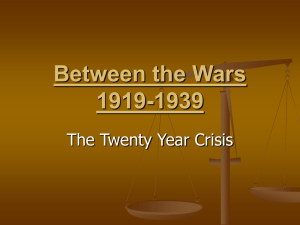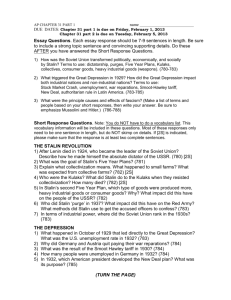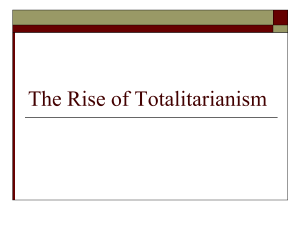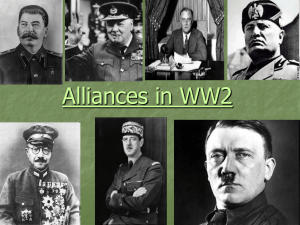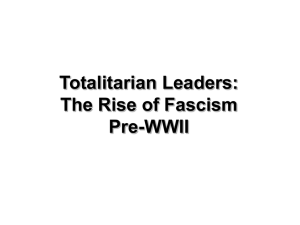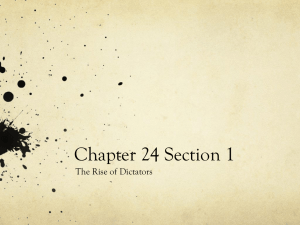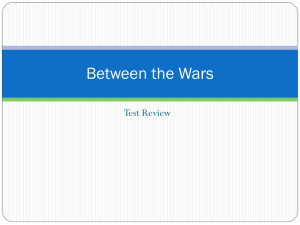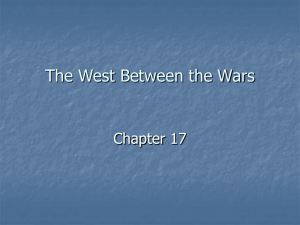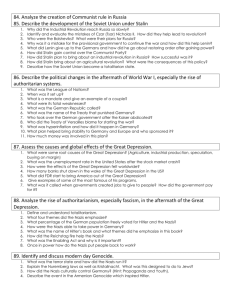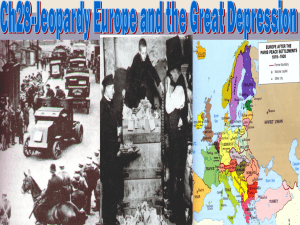Chapter 35 Vocabulary and Discussion Questions
advertisement
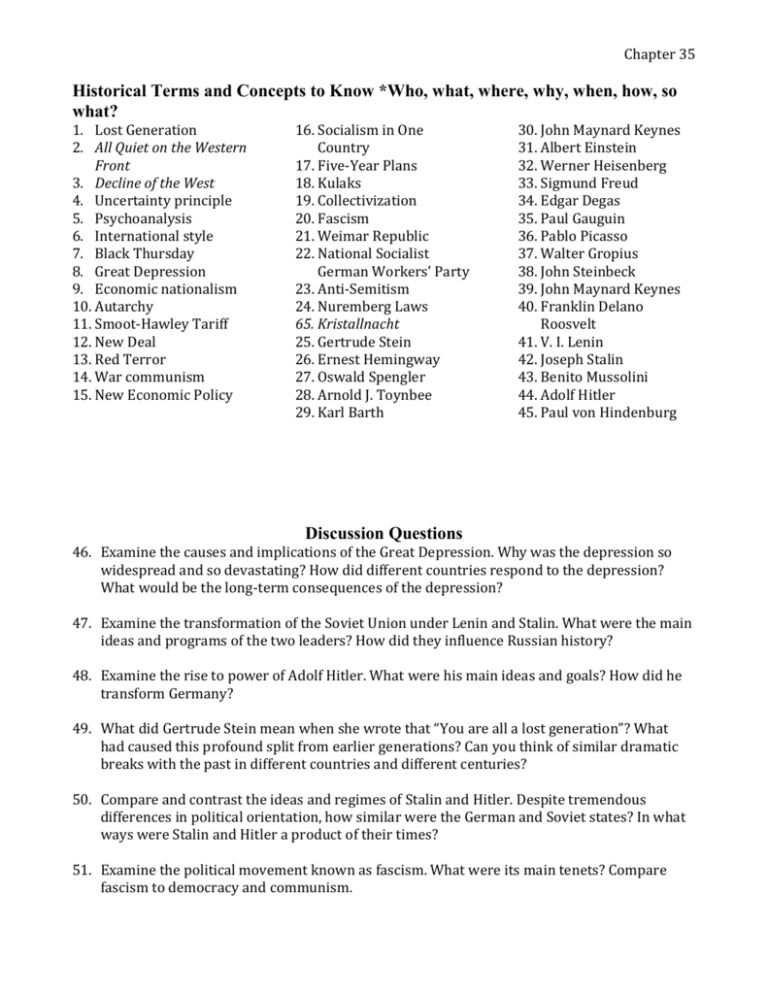
Chapter 35 Historical Terms and Concepts to Know *Who, what, where, why, when, how, so what? 1. Lost Generation 2. All Quiet on the Western Front 3. Decline of the West 4. Uncertainty principle 5. Psychoanalysis 6. International style 7. Black Thursday 8. Great Depression 9. Economic nationalism 10. Autarchy 11. Smoot-Hawley Tariff 12. New Deal 13. Red Terror 14. War communism 15. New Economic Policy 16. Socialism in One Country 17. Five-Year Plans 18. Kulaks 19. Collectivization 20. Fascism 21. Weimar Republic 22. National Socialist German Workers’ Party 23. Anti-Semitism 24. Nuremberg Laws 65. Kristallnacht 25. Gertrude Stein 26. Ernest Hemingway 27. Oswald Spengler 28. Arnold J. Toynbee 29. Karl Barth 30. John Maynard Keynes 31. Albert Einstein 32. Werner Heisenberg 33. Sigmund Freud 34. Edgar Degas 35. Paul Gauguin 36. Pablo Picasso 37. Walter Gropius 38. John Steinbeck 39. John Maynard Keynes 40. Franklin Delano Roosvelt 41. V. I. Lenin 42. Joseph Stalin 43. Benito Mussolini 44. Adolf Hitler 45. Paul von Hindenburg Discussion Questions 46. Examine the causes and implications of the Great Depression. Why was the depression so widespread and so devastating? How did different countries respond to the depression? What would be the long-term consequences of the depression? 47. Examine the transformation of the Soviet Union under Lenin and Stalin. What were the main ideas and programs of the two leaders? How did they influence Russian history? 48. Examine the rise to power of Adolf Hitler. What were his main ideas and goals? How did he transform Germany? 49. What did Gertrude Stein mean when she wrote that “You are all a lost generation”? What had caused this profound split from earlier generations? Can you think of similar dramatic breaks with the past in different countries and different centuries? 50. Compare and contrast the ideas and regimes of Stalin and Hitler. Despite tremendous differences in political orientation, how similar were the German and Soviet states? In what ways were Stalin and Hitler a product of their times? 51. Examine the political movement known as fascism. What were its main tenets? Compare fascism to democracy and communism. Chapter 35 Discussion Questions 52. Examine the causes and implications of the Great Depression. Why was the depression so widespread and so devastating? How did different countries respond to the depression? What would be the long-term consequences of the depression? 53. Examine the transformation of the Soviet Union under Lenin and Stalin. What were the main ideas and programs of the two leaders? How did they influence Russian history? 54. Examine the rise to power of Adolf Hitler. What were his main ideas and goals? How did he transform Germany? 55. What did Gertrude Stein mean when she wrote that “You are all a lost generation”? What had caused this profound split from earlier generations? Can you think of similar dramatic breaks with the past in different countries and different centuries? 56. Compare and contrast the ideas and regimes of Stalin and Hitler. Despite tremendous differences in political orientation, how similar were the German and Soviet states? In what ways were Stalin and Hitler a product of their times? 57. Examine the political movement known as fascism. What were its main tenets? Compare fascism to democracy and communism. Historical Terms and Concepts to Know *Who, what, where, why, when, how, so what? 58. Lost Generation 59. All Quiet on the Western Front 60. Decline of the West 61. Uncertainty principle 62. Psychoanalysis 63. International style 64. Black Thursday 65. Great Depression 66. Economic nationalism 67. Autarchy 68. Smoot-Hawley Tariff 69. New Deal 70. Red Terror 71. War communism 72. New Economic Policy 73. Socialism in One Country 74. Five-Year Plans 75. Kulaks 76. Collectivization 77. Fascism 78. Weimar Republic 79. National Socialist German Workers’ Party 80. Anti-Semitism 81. Nuremberg Laws 65. Kristallnacht 82. Gertrude Stein 83. Ernest Hemingway 84. Oswald Spengler 85. Arnold J. Toynbee 86. Karl Barth 87. John Maynard Keynes 88. Albert Einstein 89. Werner Heisenberg 90. Sigmund Freud 91. Edgar Degas 92. Paul Gauguin 93. Pablo Picasso 94. Walter Gropius 95. John Steinbeck 96. John Maynard Keynes 97. Franklin Delano Roosvelt 98. V. I. Lenin 99. Joseph Stalin 100. Benito Mussolini 101. Adolf Hitler 102. Paul von Hindenburg
